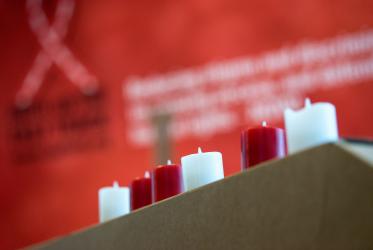Dr Cecile De Sweemer, who served as staff of the Christian Medical Commission of the World Council of Churches (WCC) from 1982 to 1986, died on the 27 November in Kinshasa, Democratic Republic of Congo (DRC). De Sweemer, a Belgian medical doctor with a doctorate in International Health from Johns Hopkins University, with extensive experience in Asia and Africa, was a dedicated and compassionate physician.
Dr David L. Gosling, former director of Church and Society at the WCC, wrote a memorial text entitled “Empowering the Weak and Confronting Power: The life and work of Cecile de Sweemer.” He describes how De Sweemer would “radiate a warm smile and extend both arms in readiness for a hug with whomever happened to be nearest.”
Along with critical issues such as the Chernobyl nuclear disaster, the Bhopal industrial gas tragedy and primary health care in West Africa, De Sweemer assisted the ecumenical movement with addressing the issue of AIDs against all the odds.
Gosling writes, above all else, De Sweemer deserves credit for “masterminding through our sub-unit the first ecumenical and international consultation on AIDS.”
Along with Gosling, De Sweemer partnered with Dr Masamba Ma Mpolo, executive secretary for Family Education at the WCC, in addressing the then-unknown challenge of AIDS in a balanced, yet compelling and succinct manner. Their work led to the first conference of WCC on HIV held in Geneva in June 1984. Facing intensive challenges, the process was kept on track by the commitment and resilience of the staff members. Various consultations and discussions led to the historic consultation held in Geneva in June 1986 on "AIDS and the Church as a Healing Community". Based on their work, the WCC's Executive Committee meeting in Reykjavik, Iceland on 15-19 September 1986 made prophetic recommendations to churches to face up to AIDS with the clarity of vision and in truth.
“The World Health Organisation (WHO) had approached the WCC to ask for an investigation into the reasons why certain churches, especially in the USA, were blocking funding for research on AIDS on the grounds that it was God’s judgement on homosexuals,” Gosling writes. “Our consultation was held at Cartigny in Switzerland and was attended by a distinguished group of medical experts, ethicists, educationists, theologians and others.”
Before coming to WCC, De Sweemer worked in Pakistan, India, Rwanda, Nigeria, Benin, Cameroon, and Ghana. She also worked as Ford Foundation's regional program advisor and for Johns Hopkins University, as coordinator for the Nigerian Hopkins Family Health Programme. She also taught at Johns Hopkins University.
Following her work at WCC, De Sweemer worked with the International Development and Research Centre, Belgian Technical Corporation, World Health Organization, United Nations Children’s Education Fund and Japan International Cooperation Agency. Her work was based in West, Central and Southern Africa; as well as South and Southeast Asia.
But De Sweemer never retired or got tired of serving people and God. In 2004, De Sweemer went to the DRC, representing the Presbyterian Church USA. In 2005, with the local communities, she established the nongovernmental organization entitled “Butoke” (Light). Located in the West Kasai Province of the DRC, Butoke ministers to victims of poverty, oppression and abuse in the domains of Food Security and Nutrition, Education, Access to Health Care, Care of those with Disabilities, and Human Rights.
She continued serving people in most need, to her last day. Her life and work will be missed by many, but the “Butoke” (Light) she lit, lives on, inspiring, enlightening and saving many lives.








